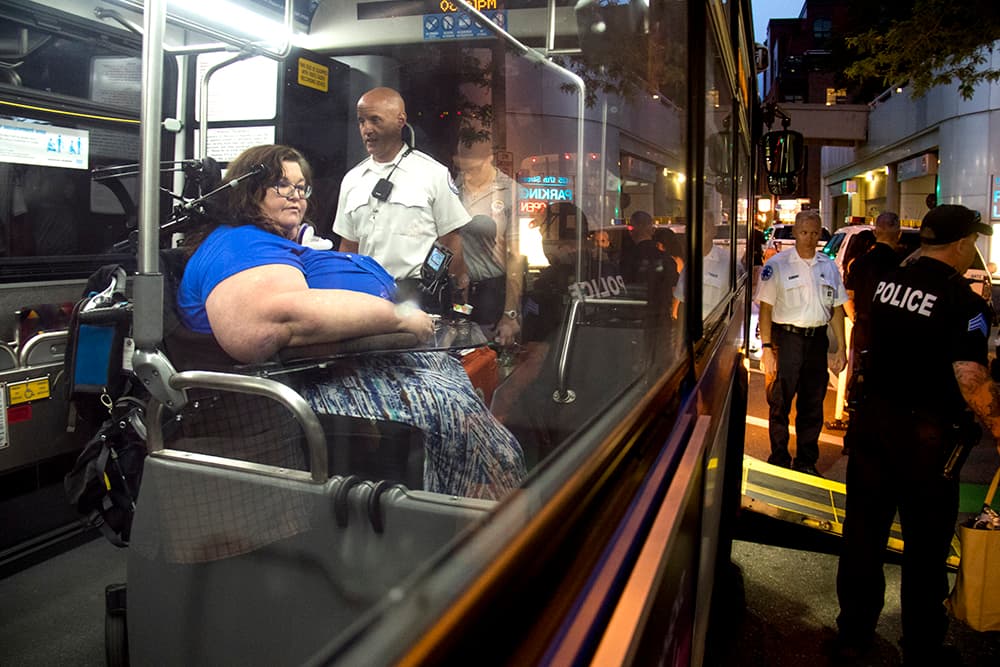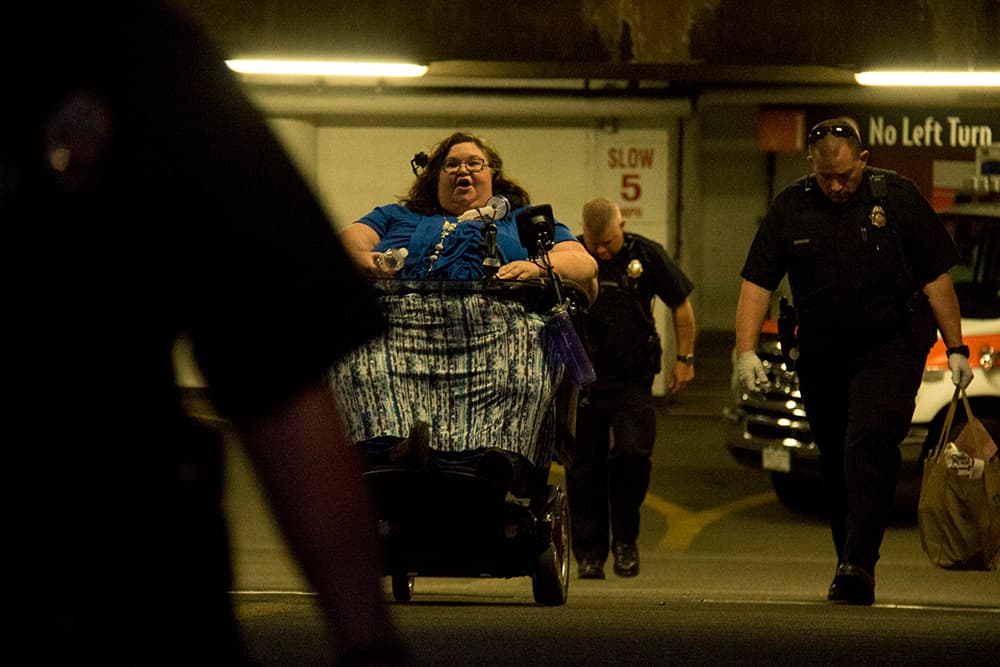
When Denver police came to arrest Carrie Ann Lucas Thursday night, she refused to tell them how to operate her motorized wheelchair. She was not resisting arrest, she said, but she was not cooperating with her own detention either. She suggested officers Google the operating manual if they were stuck.
For this, Lucas was charged with interference with a police officer along with the trespassing citations that police issued to the other nine protesters arrested in U.S. Sen. Cory Gardner's Denver office after a 58-hour sit-in to protest Medicaid cuts in the Republican health care plan.
Lucas' arrest streamed live to thousands of people after she dropped her still operating phone into her purse. In a lengthy account on her Facebook page, Lucas said the interference charge was issued against her specifically for her refusal to help officers work her wheelchair.
While I would not resist arrest, I was not willing to help the police officers learn to operate my wheelchair. Due to my disability, I have adaptive controls for my chair, and I do not use a traditional joystick. The adapted control is either velcroed to my tray or held in my hand. It is easily broken and impossible for someone else to use. My control was sitting in my lap the entire time, but because it just looks like a button on a wire, they couldn't figure out that was how I control my chair. Rather than simply disengaging the motors to push the chair, the police and paramedics spent a great deal of time trying to find a joystick on my chair. They kept moving my ventilator tubing around, as if plastic tubing would drive my chair. Because I am trached, moving the tubing moves my trach and causes pain (and causes me to cough). They stopped doing that after I complained.
In their search for a nonexistant joystick, they disconnected the display (where I can see what mode the chair is in), which renders the chair inoperable. They also disconnected the switches for my head array, which also prevents anyone from operating any part of my chair. They kept threatening to take me from my chair and take me out of the building by ambulance and bring my chair at some later date. I resisted all efforts to do that. First, separation from one's chair can be deadly to people with severe disabilities. Chairs get damaged, and sometimes "lost" for long periods of time. They way the officers and paramedics were wanting to transfer me would cause injury and risk broken bones. Eventually they released the motor locks and pushed me out of the room and into the basement.
That the interference charge related to the wheelchair issue seems to be corroborated by the probable cause statement issued by police.
"Lucas was in a motorized wheel chair, and I could not see any controls for the wheel chair," Officer Christopher Blanchard wrote in the probable cause statement. "... Lucas said that she had removed the wheel chair control and the control was not on scene anymore. We spoke with Lucas for several minutes, but she refused to operate the wheel chair. We had paramedics from Denver Health Medical Center come to the scene and they could not figure out how to operate the wheel chair. Sergeant C. Jones pleaded with Lucas to just operate her wheel chair so that we could leave the office, but she refused. I examined the wheel chair base and I was finally able to release the motors on both sides, so that the chair could be pushed.
"Lucas hindered our ability to operate her wheel chair by stating that she had removed the wheel chair control, rendering the wheel chair inoperable. Lucas insisted that she was not resisting, but she was not cooperating either. Rendering the wheel chair inoperable delayed her transport to jail."
Lucas was not actually booked into the Downtown Detention Center because jail officials were concerned about providing for her medical needs.

However, nine other protesters, ranging in age from 24 to 61, several of whom also use wheelchairs, were booked. All were charged with trespassing and three were also charged with interference. Lonnie Smith, 61, faces a third charge of resisting arrest.
Here is how the probable cause statement describes his actions:
"After several warnings, I attempted to guide Lonnie's wheel chair out of the door and he grabbed onto another wheel chair, diving out of his own chair. He wrapped his left arm around the chair and grabbed hands with another female protester laying on the floor in front of him. He refused to give his right hand, holding onto the the other protester, after I instructed him several times to let go. Finally I was able to place the zip tie hand cuff on his right arm, and when I attempted to grab his left arm, he pulled it away from me. He grabbed onto my own arm, squeezing tightly and refused to let go when I asked him to. When he let go, he scratched my arm with his finger nails, causing small open scratches, then shoved his own hand into his lap. He was hunkering his body over his arm so I could not grab it. He then grabbed my arm again when I attempted to grab his wrist in his lap. Finally he was placed into handcuffs. I lifted him up into his chair and escorted him to the Sheriff's van."
They were still in jail Friday evening, despite receiving personal recognizance bonds earlier in the day. Jail officials said the booking system was down, while their attorney, David Lane, described the situation as "incompetence." (Update: Protesters were released early Saturday morning.)
A Denver police spokesman referred questions about the charges to the probable cause statements. It's ultimately up to the City Attorney's Office to determine whether to pursue the charges recommended by police. Representatives of the city did not immediately respond to questions about the charges Friday or to questions about why the other protesters were booked into the jail rather than cited and released.
"This is overcharging," said Mark Silverstein, legal director for the American Civil Liberties Union of Colorado, referring to Lucas' case. "She is not hindering. She is simply declining to affirmatively assist them."
This is how interference is defined in the municipal code: "It shall be unlawful for any person, in any way, to interfere with or hinder any police officer, any member of the police department, or any person duly empowered with police authority, while such officer, member, or person duly empowered with police authority is discharging or apparently discharging their duties."
City Attorney Kristin Bronson said she does not anticipate seeking jail time for any of the protesters based on the information she has right now.
“Each case will be evaluated independently, and we are committed to making sure all of the defendants' constitutional rights are upheld and protected as we go through the process,” she said in an emailed statement.
Lane said the interference and resistance charges should be "dismissed immediately."
"You don't have to help the police arrest you," he said. "You don't have to give them private driving lessons on your wheelchair."
Silverstein, who is not directly involved with the case, said interference is "a frequent baseless charge in a variety of circumstances," adding that he would be "surprised" to see someone charged in this way for going limp in response to an arrest.
"The city attorney should drop it," he said.
This story has been updated to include comment from the Denver City Attorney's Office and from attorney David Lane.












